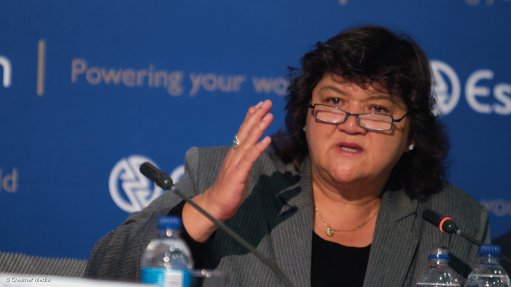
Public Enterprises Minister Lynne Brown
Photo by: Duane Daws
Public Enterprises Minister Lynne Brown has reiterated the need for a “deep dive” into Eskom’s operational and financial problems, while warning that load-shedding is likely to remain an ever-present threat over the coming two years as the State-owned utility takes action to address its maintenance backlog.
Speaking fresh from a Cabinet meeting in Cape Town and amid ongoing nationwide power interruptions, Brown again apologised for the inconvenience caused by the power cuts and promised improved communication from Eskom and the municipalities on the load-shedding schedules.
The combination of unplanned outages and scheduled maintenance was likely to persist into the high-demand winter months, when controlled, rotational load-shedding and load curtailment from energy-intensive users would be deployed to balance the grid and ensure a black-out was avoided.
In the coming weeks announcements would also be made on the stabilisation and expansion of the Eskom board, which was currently led by interim chairperson Dr Ben Ngubane, who took over following the resignation of Zola Tsotsi at the end of March.
Several senior management posts were also currently filled by acting executives, following the suspension of CEO Tshediso Matona and three other executives by the-then Tsotsi-led board in mid-March.
Brown indicated that she would be seeking Cabinet concurrence, in the coming weeks, on the appointment of additional board members to raise the number of nonexecutive directors from nine currently to 13 and to diversify the skills and experience of the board. For instance, efforts were being made to appoint a Chartered Accountant to the main oversight body.
Subsequent to Tsotsi’s resignation, the board had finalised the terms of reference for the “deep dive” probe of the utility’s maintenance, liquidity and primary-energy problems and it had reportedly short-listed two companies to carry out the investigation, which would endure for three months.
Brown said her only prerequisite was for the investigation to be conducted by a truly independent organisation, with no links to the utility. She argued that an independent view of Eskom’s liquidity situation was required, as she had been unable to gain full visibility from Eskom itself.
She also wanted a detailed assessment of the maintenance practices and backlog, as well as on Eskom’s diesel and coal costs, which had been rising uncontrollably in recently years. Eskom was spending R1-billion a month on diesel alone, which was placing major strain on its financial stability.
In parallel, the Cabinet-appointed war room was also making progress in coordinating the actions needed to both stabilise Eskom financially and operationally and to ensure “integration to address the challenges we are facing with electricity”.
Eskom’s maintenance strategy and execution were receiving “focussed attention” from the war room in an effort to improve plant availability and performance.
“Eskom has deployed 30 experienced senior managers from head office to the power stations to ensure that maintenance is done correctly,” Brown reported.